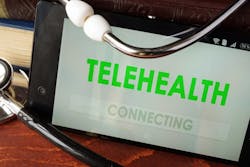In another indicator to Congress that Medicare beneficiaries cannot lose access to needed telehealth services following the public health emergency, a bipartisan group of 50 senators has reintroduced the CONNECT for Health Act.
U.S. Senators Brian Schatz (D-Hawaii), Roger Wicker (R-Miss.), Ben Cardin (D-Md.), John Thune (R-S.D.), Mark Warner (D-Va.) and Cindy Hyde-Smith (R-Miss.) led the group to the bill’s reintroduction.
The massive telehealth bill has had multiple iterations and broadly calls for expanded access to telehealth services during the COVID-19 pandemic to be made permanent, as well as other provisions. Elements from the CONNECT for Health Act that have allowed Medicare beneficiaries in all areas of the country, and in their homes, to utilize telehealth services, as well as more types of healthcare providers to provide telehealth, were included in previous COVID-19 legislation but will expire following the pandemic unless congressional leaders act now to make those measures permanent.
“The last year has shown us that telehealth works, it’s popular, and it’s here to stay,” said Sen. Schatz. “Our comprehensive bill makes it easier for more people to safely get the care they need no matter where they live.”
Three provisions from the CONNECT for Health Act were included in COVID-19 relief legislation to expand access to telehealth during the pandemic. As a result, telehealth has obviously seen a sharp rise in use since the start of pandemic. Data shows that the number of Medicare beneficiaries using telehealth services increased by about 13,000 percent in just a month and a half during the pandemic.
“If we’ve learned anything in the past 14 months, it’s that people are better off when they’re able to see a doctor quickly, easily, and from the comfort of home. This is particularly the case for folks in rural or medically underserved communities, who may otherwise have to travel long distances to get basic medical services,” added Sen. Warner. “I’m proud to introduce this legislation, which will enable Virginians to make the most of telehealth capabilities and access the quality and affordable health care they need as soon as they need it.”
The CONNECT for Health Act was first introduced in 2016 and is considered the most comprehensive legislation on telehealth in Congress. Since 2016, several provisions of the bill were enacted into law or adopted by the Centers for Medicare & Medicaid Services (CMS), including provisions to remove restrictions on telehealth services for mental health, stroke care, and home dialysis.
The updated version of the CONNECT for Health Act builds on that progress and includes new and revised provisions that will help more people access telehealth services. Specifically, the legislation will:
- Permanently remove all geographic restrictions on telehealth services and expand originating sites to include the home and other sites
- Allow health centers and rural health clinics to provide telehealth services, a provision currently in place due to the pandemic but on a temporary basis
- Provide the Secretary of Health and Human Services with the permanent authority to waive telehealth restrictions, a provision currently in place due to the pandemic but on a temporary basis
- Allow for the waiver of telehealth restrictions during public health emergencies
- Require a study to learn more about how telehealth has been used during the current COVID-19 pandemic.
Companion legislation has been introduced in the House of Representatives by U.S. Representatives Mike Thompson (D-Calif.), Peter Welch (D-Vt.), David Schweikert (R-Ariz.), Bill Johnson (R-Ohio), and Doris Matsui (D-Calif.).
The American Telemedicine Association (ATA) released a statement, saying it remains grateful to these telehealth champions for their long-standing commitment to ensuring patients have access to safe, affordable, and effective care when and where they need it, including rural and underserved communities.
“We are indebted to these Congressional leaders, including Sen. Schatz, Sen. Wicker, and the co-sponsors of this bill, who have long supported telehealth and continue to persevere in their efforts to make access to telehealth a permanent part of care delivery in our country,” said Ann Mond Johnson, CEO, the ATA. “We have an unprecedented opportunity to modernize our healthcare system, solve for unacceptable disparities in care, and enable our healthcare providers to do more good for more people.
Mond Johnson added, ““The telehealth cliff is looming, casting much uncertainty and concern for the health and safety of Medicare beneficiaries, and the sustainability of our already overburdened healthcare system. By ensuring Medicare beneficiaries do not lose access to telehealth after the COVID-19 public health emergency ends, the CONNECT ACT would protect seniors from the telehealth cliff. We urge Congress to recognize telehealth as a bipartisan, commonsense solution and speedily advance comprehensive policy that will allow permanent access to telehealth and virtual care,” added Mond Johnson.


